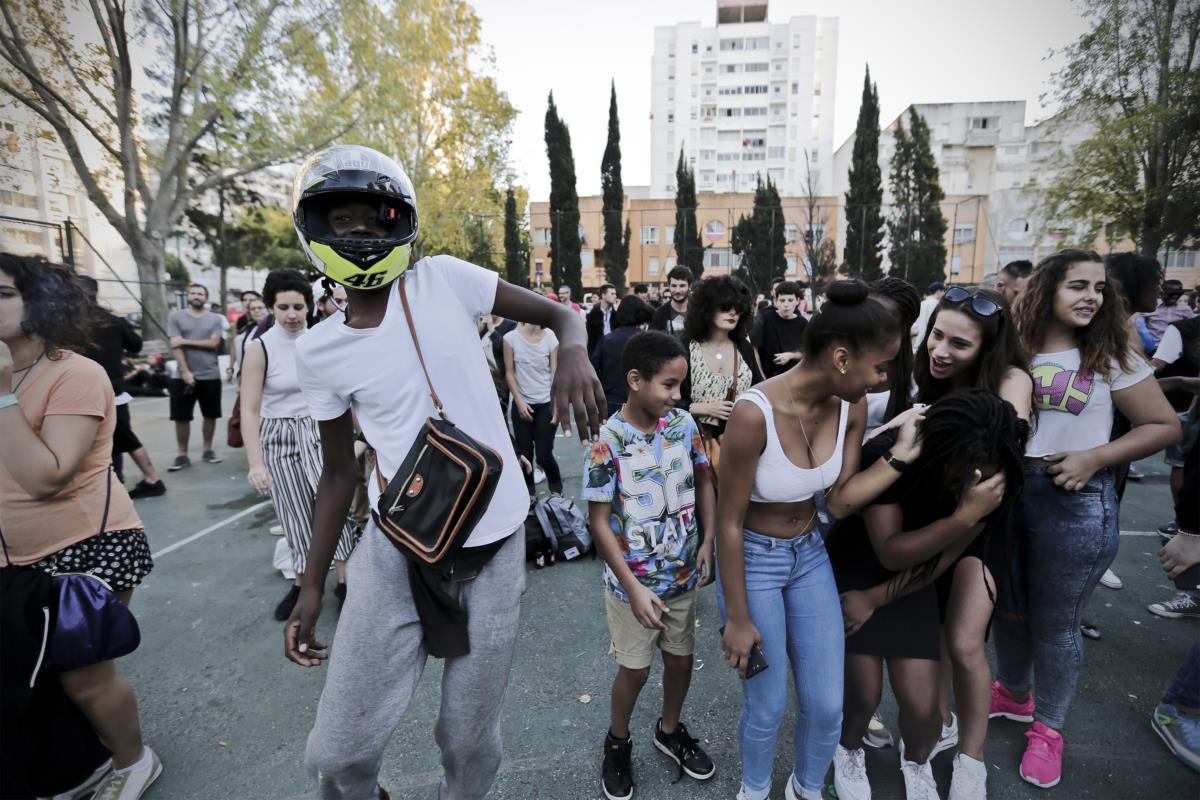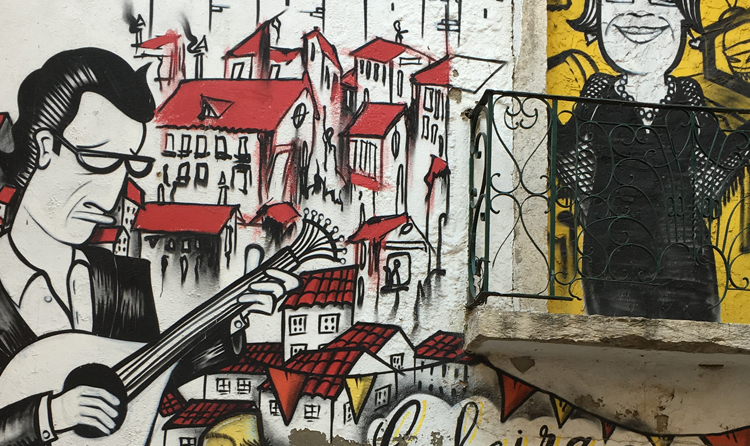
Lisbon has long been listening to Africa, Brazil and Carribean, and for more than 50 years, the city has been the melting pot of constantly evolving blended black music genres.
In 2014, as I started to come more often to Portugal, I already knew fado music, sung from the North to the South of the country, in Porto, Coimbra and Lisbon, its birthplace. For the last ten years during the yearly visits to my Portuguese relatives up North, I had never missed a chance to go and merge into the Alfama neighborhood in Lisbon, where I would listen to this chant delivered by amateurs, that they call fado vadio (stray fado or thug fado).

But in the popular Mouraria neighborhood that I started to explore two years ago, I’ve been discovering pieces of Africa in every street. Lisbon would be such a pale and sad city without them. I then learned to enjoy the Cape-Verdian cachupa that Beto used to cook in his restaurant next to his own house, or the pastéis de milho that Maria put on her menu next to the Angolan muamba de galinha in the tiny place she runs, called São Cristovão. A few meters away, the Mozambican chef Aziz offers generous portions of curry prawn served with quiabos. In those places, dinners often ended with live afro music played by friends of the owners.
The memory of a specific night in Lisbon is still very vivid. It was a Monday night and as I was walking along the famous yellow tramway tracks, I spotted a hand-painted board that read “Shilabo’s”, the name of this tiny Angolan restaurant. As it was already too late to order the muamba de galinha or the fumbua de cavalo, I opted for beer in a small glass bottle and sat at one of the three tables of the minuscule dining room, occupied only by two other customers. At the table on my left, three musicians were jamming, and I would later get to know the identity of two of them: Chalo Correia from Angola, Bilan from Cape Verde. Both are excellent guitarists and their voices are strongly emotional. Their friend took good care of the percussions, hitting the beer bottles with a simple knife, and shaking the table mats and small maracas. The improvised band performed a series of Cape Verdean mornas and Angolan sembas, that immediately made me forget about fado, the only music from Lisbon that would give me goosebumps and teardrops until then. That was it: I was trapped into this music that I would investigate, dissect, compare, feel, listen and dance to for the next months. It’s as if a completely new and parallel world had just opened into Lisbon, the city I had already fallen in love with ten years before. It was love at first sight, again, but this time with the African Lisbon.
Indeed, the Portuguese capital city has also been the melting pot of constantly evolving blended black music genres for more than 50 years. It’s a characteristic that cannot be ignored when looking at the history of a city located at the crossroads of three continents: Lisbon has long been listening to Africa, Brazil and Carribean.
Musical call-and-response
Africa, because people originating from the former Portuguese colonies (mostly Angola and Cape Verde, but also Mozambique, Guinea-Bissau and São Tomé and Príncipe) massively settled in the suburban zones of the so-called “white city” (because of its unique clear light). First in the 1950s and 1960s when they filled the labour shortage due to the Portuguese large exile abroad who fled the dictatorship and misery. Then in 1974 and 1975 after they gained independence from Portugal through the Carnation Revolution, seeking for political stability that most countries did not offer (namely, Angola and Mozambique who sank into civil wars). But historians date back the large African presence in Lisbon (20% of its 250.000 inhabitants) to the 16th century, up until the 19th when the Portuguese monarchy stopped to force slaves into the country. Though this large presence ended after the abolition of slavery, this custom left many genetic imprints, but also linguistic and cultural marks in Portuguese society. Musicologists José Ramos Tinhorão (Brasil) and Rui Vieira Nery (Portugal) even proved the African origins of fado music, coming from the Angolan dance and chant called lundum!
Brazil, because the cultural and commercial trades between this country and Portugal (and Sub-Saharan Africa) have been intense since the 16th century and the colonization of the Latin land. Again, the two musicologists claim that this region gave origins to fado music through the African slaves. The quality of the exchanges between the three territories was noted by Portuguese Jesuit philosopher António Vieira, who wrote in the 17th century that “Brazil has its body in America and its soul in Africa”.
Caribe, because the Portugal-based descendants of African territories still perpetuate and adapt the rhythms and melodies that gave birth to zouk, rumba and merengue. The latter comes from Angola, and rumba originates from Congo. West Indies zouk turned into cola-zouk in Cape Verde, kizomba in Angola and zouk bass in Portugal. A never-ending call-and-response movement.
Africa is in the air
That explains why African-influenced music has been sung, played and danced in Lisbon’s clubs, streets and homes for at least 60 years. African food, too, is to be found everywhere, but this is not the subject of this article, even if Shakespeare once wrote: “if music is the food of love, play on”.
But African music started to be heard during the warm nights of Lisbon only from the second half of the 1960s, with the massive arrival of migrants mainly from Cape Verde and Angola. Those who brought their collection of records were playing them at underground clubs, and musicians would start (again) bands with their fellow countrymen who had just put their feet in Portugal. The whole capital city discovered the music and dances coming from its former colonies: amongst them, the Cap-Verdian coladeira (from koladera i.e. “to sing colá in the streets”), the Angolan semba (from masemba, plural for semba, “the belly bump” in kimbundu language). At the same time, some lusophone bands or artists had already started to perform out of their countries, sometimes forced to flee the censorship of the Portuguese colonial power or the independence wars. They were seen as examples and they helped improve the focus on this music. In Lisbon, you can frequently stumble upon and attend the shows of Bonga (the Angolan master of dizanka, whose records were first produced in the Netherlands) and his fellow countryman Waldemar Bastos. Back then, you would often see Voz de Cabo Verde, a Cape-Verdian band that was founded in Rotterdam in 1965, and relocated to Lisbon in 1972, with the late Bana on vocals), along Tito Paris or Nancy Vieira, to name a few.
Creolisation and internationalization
In the second half of the 1990s, the suburbs of Lisbon – where most of the lower class African migrants settled when they came to fill the labour shortage in the construction sites the EEC funded – started to make themselves heard through hip-hop sung in Portuguese (Da Weasel), in Cape-Verdian crioulo (Boss AC) or in calão from Luanda (a mix of Portuguese language and Angolan kimbundu).
Then at the beginning of the 2000s, the new generation of musicians adapted a new musical genre that was everywhere in Angola – kuduro, which bluntly means “hard ass” (cu duro) but also refers to the “hard environment” people lived in (ku means “the place” in kimbundu). This electronic trance inspired by Angolan traditional percussions and mixed with Caribbean soca and Western techno and eurodance speaks to the bodies of the dancers just as much as to their brains: it’s a true social rant coming from Luanda’s musseque, the slums in the outskirts of the capital of Angola. Kuduro would be “the poetic, though inconscient, recreation of the intensity of life in Luanda”, as Kalaf Epalanga puts it. Epalanga is the main brain of Lisbon-based collective Buraka Som Sistema, who have been working their asses off since 2006 to successfully promote around the world their Portuguese version of kuduro. The name of this gang of artists is a reference to Buraca, the suburbian neighborhood of Lisbon where its cosmopolitan members used to live – they come from Portugal, Angola, Moçambique, Cuba and Brazil. The Lisbon version of kuduro quickly left the suburbs and even convinced M.I.A. to collaborate on the band’s second album in 2008. Their last recorded musical effort dates back to 2011, and the relentless kuduro champions decided to put an end to their production career in 2016, after 10 years of generous promotion of the culture they come from. Still, they chose to embark on a new mission: discover and support the emerging talents of Portugal.
Music from the suburbs takes over the city centers
Actually, Great Lisbon’s got talent when it comes to reinvent African music: Batida, AF Diaphra, Octa Push… we’ll cover those names later. For example, since 2011, a dozen young producers, aged 17 to 30, united under the Príncipe Discos flag. Their monikers: DJ Marfox, DJ Nigga Fox, DJ Lilocox, DJ Nervoso… Literally “Prince Records”, their aristocratic-named label was founded by four Lisbon-based activists with the sole purpose of amplifying the blended sounds of the suburbs. It’s a mix of Angolan kuduro and batida (the “beat”) and Western techno.
The collective holds a monthly club at MusicBox, one of Lisbon’s most edgy and respected music places. The avant-garde spirit of those “Noite Príncipe” gatherings bizarrely contrasts with the heavy-partying regular crowd that floods in the streets around – Erasmus exchange students, cheap beer-chasing Anglo-Saxon males and the tireless local youth. But inside the club, a surprisingly blended audience is dancing like crazy: be they coming from the suburbs of the city centre, hip or newbies, white or person of colour, they all queue outside from 2 a.m. and do not leave the club before having sweated their bodies out and shaken their hips to the bone. A true dance marathon where you’d witness unique dance moves and physics-law defying hip and footwork.
Today, in 2016, the intensity and the presence of the African-influenced or inspired music in Lisbon – especially in the venues located in the city centers – show the quality and the successful efforts of the artists, producers and everyday activists. Promoting and spreading this music out of Lisbon and mostly behind the Portuguese borders is a powerful way to free the local production from the discriminating labels and prejudices (talking about racism against people of African descent is still a huge taboo in Portugal) and to help it grow and consolidate as a strong scene that proudly advocates its blended features.
This is precisely what this new column aims to do: keep the ears wide open towards Lisbon sounds and amplify the ever-changing batida’s pulse of the city, looking towards an uncertain future, undoubtedly every day more cosmopolitan, like African music has always been.
Celeste/Mariposa are Lisbon-based and afro-lusophone specialized DJs, promoters of the monthly Afrobaile night and founders of C/M Discos label, who shared their vision in a recent interview they gave to the national daily Público : “abroad, they tell us that Portugal is now at the centre, whereas we’ve got used to be considered as the periphery, just because it’s the way we grew up as Portuguese people. And then, for the first time, someone says we would be at the centre. And it’s true that we’re at the centre of our small world: at the center of the PALOP countries’ diaspora – the Portuguese-speaking African countries.”
Yes, Lisbon might be at the center of something: the continents. And it’s not that small.
Title photo: © Bruno Simão – The audience at the Festival Zona Não Vigiada in Chelas (Lisboa, 2015)



